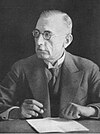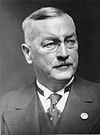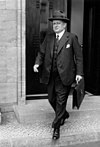Papen's cabinet

The Papen Cabinet , a presidential cabinet , was the government of the German Empire of the Weimar Republic from June 1, 1932 to December 3, 1932. The cabinet, headed by the noble Franz von Papen as Reich Chancellor and almost exclusively , became of contemporaries non-party ministers with noble descent or academic background belonged, also mockingly referred to as the Cabinet of Barons . According to the former Papen employee Fritz Günther von Tschirschky , the name was invented by the National Socialist head of propaganda, Joseph Goebbels , and was later picked up by the government's social democratic and communist opponents.
The Papen cabinet was formed on the initiative of Kurt von Schleicher , who worked in the background and who had also chosen von Papen. Besides the non-party members, only the German Nationals were represented in the government, to which they contributed three ministers. Most of the members of the government were virtually unknown to the general public at the time of their appointment. Even conservatives saw the government as a temporary solution. The right-wing publicist Edgar Julius Jung , for example, when the cabinet list was presented to him by a friend on June 1st during a lecture in front of the Dortmund Industrial Club, the verdict: “I know almost all of them, they are characters who pass by. This government is of a transitory nature. What will come after her? "
The presidential cabinet only lasted six months. The reason for this was that it could not find a majority in the Reichstag and, according to Schleicher's simulation game Ott, President Paul von Hindenburg considered a breach of the constitution by ignoring a vote of no confidence by the Reichstag or a coup d'état as too dangerous. Eventually it was replaced by the Schleicher cabinet .
composition
Reich Minister
| Papen cabinet June 1, 1932 to December 3, 1932 |
||||
|---|---|---|---|---|
| Chancellor | Franz von Papen | independent | ||
| Ministry of Foreign Affairs |
Konstantin Freiherr von Neurath from June 2, 1932 |
independent | ||
| Interior | Wilhelm Freiherr von Gayl | DNVP | ||
| Finances |
Johann Ludwig Graf Schwerin von Krosigk from June 2, 1932 |
independent | ||
| economy | Hermann Warmbold | independent | ||
| job | Hermann Warmbold was entrusted with running the business until June 5, 1932 |
independent | ||
|
Hugo Schäffer from June 6, 1932 |
independent | |||
| Judiciary |
Franz Gürtner from June 2, 1932 |
DNVP | ||
| Reichswehr | Kurt von Schleicher | independent | ||
| post Office | Paul Freiherr von Eltz-Rübenach | independent | ||
| traffic | Paul Freiherr von Eltz-Rübenach | independent | ||
| Food and Agriculture | Magnus Freiherr von Braun | DNVP | ||
| Reich Minister without portfolio | Franz Bracht (since October 29, 1932) | independent | ||
| Reich Minister without portfolio | Johannes Popitz (since October 29, 1932) | independent | ||
Officials of the Reich Chancellery
| Officials of the Reich Chancellery | ||
|---|---|---|
| State Secretary of the Reich Chancellery | Erwin Planck | |
| Joint service with Reich Chancellor and State Secretary | Ministerial Director Edwin Pukass | |
| Speaker | Ministerialdirektor Viktor von Hagenow (put into temporary retirement on July 1, 1932) | |
| Speaker | Ministerialrat Othmar Feßler | |
| Speaker | Ministerialrat Heinrich Vogels | |
| Speaker | Ministerialrat Richard Wienstein | |
| Speaker | Ministerialrat Edwin Pukass | |
| Speaker | Higher Government Councilor Hans Thomsen | |
| Speaker | Senior Government Councilor Curt Walter | |
| Speaker | Upper Government Councilor Otto Westphal | |
| Speaker | Senior Government Councilor Joseph Krebs | |
| Ministerial Office Director | Rudolf Ostertag | |
| Press chief of the Reich government | Ministerial Director Heinrich Ritter von Kaufmann-Asser (until August 17, 1932) | |
| Press chief of the Reich government | since August 17, 1932: Ministerialdirektor Erich Marcks | |
See also
Web links
- Rainer Schaefer: The Papen cabinet . The Weimar Republic, Volume III
- Extract from: Weimar Republic . Federal Agency for Civic Education
- Volume 456 - Changes in the Imperial Government. Negotiations of the Reichstag
Individual evidence
- ^ Fritz Günther von Tschirschky: Memories of a high traitor . 1972, p. 81.











